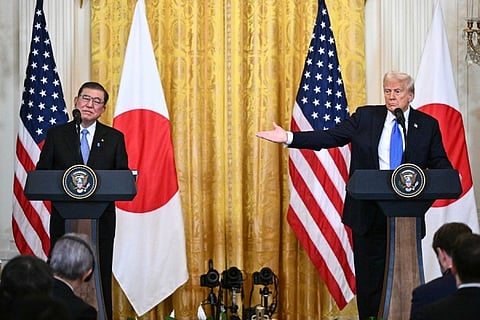
- NEWS
- the EDIT
- COMMENTARY
- BUSINESS
- LIFE
- SHOW
- ACTION
- GLOBAL GOALS
- SNAPS
- DYARYO TIRADA
- MORE

US President Donald Trump and Japanese Prime Minister Shigeru Ishiba condemned China for “provocative activities” in the contested West Philippine Sea (WPS), which Beijing claims entirely.
“The two leaders reaffirmed their strong opposition to the PRC’s unlawful maritime claims, militarization of reclaimed features, and threatening and provocative activities in the South China Sea,” a joint statement said after Trump and Ishiba met in Washington, referring to China by the abbreviation of its official name.
The two leaders reaffirmed their position during a bilateral summit in Washington D.C., where they also opposed Beijing’s militarization of reclaimed features in the sea lane.
“The two leaders shared views on the severe and complex security environment and expressed their determination to continuously cooperate to realize a free and open Indo-Pacific,” the White House said in a statement.
The Philippines has condemned China’s increased presence in the WPS, the area covering the country’s maritime zones in the South China Sea, and its recent deployment of coast guard vessels some 100 nautical miles off the Zambales province coastline.
‘The two leaders shared views on the severe and complex security environment and expressed their determination to continuously cooperate to realize a free and open Indo-Pacific.’
Trump and Ishiba reaffirmed their willingness to advance their “multilayered and aligned cooperation” among like-minded countries, including through its trilateral setup with Manila.
On top of promoting a free Indo-Pacific, the leaders said the cooperation would bring “high-quality infrastructure investments in the region,” such as the deployment of Open Radio Access Networks in third countries.
The US and Japan earlier pledged $8 million for Open Radio Access Network (RAN) field trials, which aims to ensure a reliable and secure information and communications technology ecosystem in the country.
This month, Japan will formally sign the diplomatic notes for its non-project grant aid for an Open RAN System at the University of the Philippines.
Filipinos facing deportation getting help.
The Department of Labor and Employment (DoLE) said it is working with the Department of Foreign Affairs (DFA) to provide employment opportunities for Filipinos at risk of deportation from the United States under Donald Trump’s presidency.
Labor Secretary Bienvenido Laguesma in a televised interview on 8 February said following the President’s directive, “We are coordinating with the DFA so that if DoLE has programs available, they can also be extended to our fellow Filipinos who may face deportation from the United States.”
He added that DoLE is also working with the Public Employment Service Offices of local government units, and that deported Filipinos may benefit from existing employment facilitation programs.
